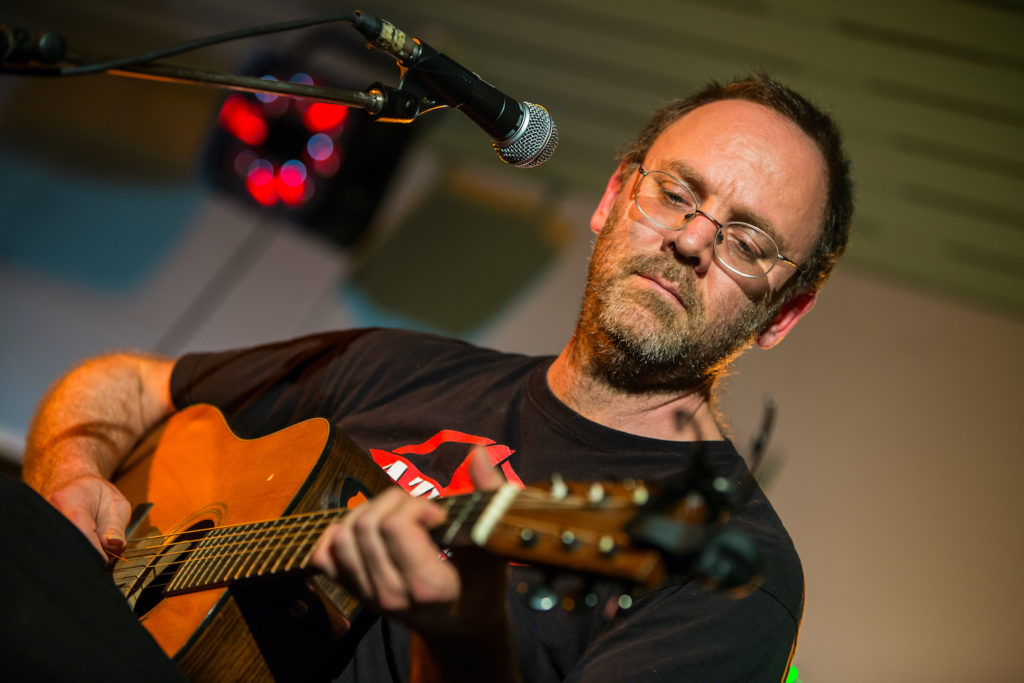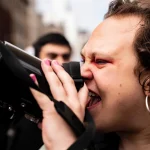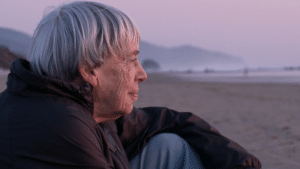David Rovics has been an independent, leftist musician for decades. Left Voice sat down with him to discuss his new album. This interview has been edited for length, the full interview is available on Youtube.
Thanks again for talking with me, this is kind of a big moment for me because when I was first becoming politicized as a teenager, I listened to your music a lot.
That’s great. That’s a great time of your life to be listening, whatever you were listening to as a teenager, you remember for the rest of your life. So it’s such a privilege to have been doing it long enough to actually like, you know, have people growing up, listening to my music. It’s a function of getting old, you know,
Just to kick it off, tell us a little bit about your new album. Why did you decide to record it now? What’s the idea behind the album?
It, the new album, it was basically, I mean, it’s like a multi-instrumental two country production because of the Oregon employment department. I mean, to be perfectly straightforward, I lost all my gigs and of course, like 65% of artists in the U.S. became fully unemployed with the onset of the pandemic. Here in Oregon, at least for many of us, it took seven months to get on unemployment. For others, I think they’re still waiting. I mean, the system is so broken. It’s like, it’s run on 1980s software, you know, but you know, the computer system for the Oregon employment department, but basically I wanted to make an album, but it ended up being more the kind of thing that I like to do when I can which involves drums, bass, and more instruments, because we could afford to do it because that’s the employment department, but otherwise it’s basically pretty much all of the songs were written from late fall, 2019 till late fall 2020. And so mostly they kind of tell the story of the pandemic at least to some parts of the story.
One of the big through lines of both this album and your last couple [of albums] is the Black Lives Matter movement. And I know that that was a big deal in Portland, where you are. And so I was wondering if you could talk a little bit about how you feel your music interacts with the movement and sort of what’s going on in Portland now.
There has been a lot going on in Portland. I mean, as everybody knows. People usually are asking about the history of why is there so much going on in Portland that is a very interesting and complicated thing that goes way back to the 19th century, but it’s been amazing that there’s been so much happening, and it really has been surprising me…I guess you could say, the main focus has been around the housing crisis in this country and and many other countries. Of housing as a fundamental right.
And rent control. And, you know, no social spending policies will ever do anything for us unless we have control over the cost of housing. And control of other basic expenses in life. But, as anybody who understands basic math, if the cost of everything rises then it doesn’t matter if you’re being paid $20 an hour or $50 an hour or whatever, the rent has to be a certain amount, otherwise it’s not affordable, you know?
So what’s been happening has been an amazing, amazing convergence of multiple movements. But I would say it’s all part of the same movement as it’s becoming more and more clear: you can’t be in favor of racial justice without being in favor of housing justice. I mean, what we could call the ethnic cleansing of the city between 2000 and 2010 [happened as] as a function of gentrification, not a function of police brutality, not a function of the historic racism of this city or this state — which is a huge thing. I mean, racism and white supremacy is why Oregon is as white as it is, you know, quite simply, but there is a population of many different people of color in Portland and elsewhere in Oregon.
And this population was growing until the city became so expensive. And now only parts of that population are growing. Other parts are shrinking. And especially during the beginning of the process of gentrification, apparently the numbers are not declining like they were between 2000 and 2010, but between those two censuses, this city lost half of its black population. So clearly racial justice and housing justice, these things are impossible to disentangle, [just as] impossible as disentangling racial justice from police brutality. I mean, they’re all completely intertwined and that is becoming more and more clear to more and more people certainly around here.
But in terms of my own participation and my music and stuff like that, you know, with the isolation of the pandemic that especially at the beginning I mean, even at the protests, there is often no music. I mean, often people are scared to sing. Understandably of course. [But] it’s great that I keep on hearing from people who are saying I’m at a protest and I’m listening to music because if I weren’t getting those emails and those messages and stuff, I would have no idea really that I was as relevant as I am to some people. And it’s incredibly heartwarming to know when it’s easy to really feel isolated, including for me in this pandemic. And if it’s easy for me to feel isolated living with a happy family and having thousands of fans around the world, I can’t imagine what it’s like for people who are actually isolated, like one in four households in this country is a person living alone. And they’re not people that know thousands of people around the world for the most part. But it’s been so heartwarming to get all these messages especially from teenagers who seem to be more inclined to send messages on Twitter or whatever, like say, “Hey, I’m listening to music”
I think one of the most defining elements of your work is this interest in telling the stories of important historical struggles and figures and things like that. And I was wondering if you could talk about how you came to be so dedicated to, you know, talking about history and why you think it’s so important to use music in that way.
I guess when I first get into it, I always have trouble remembering far back enough to think about what happened first, you know, but definitely when I was young and I first got exposed… what comes to mind is listening to this one album of Bob Dylan. I mean, as cliche as that is, but his album that has “the Lonesome Death of Hattie Carroll” and “North Country Blues” and all these other incredibly powerful songs that tell stories about recent history in his case. Those songs just told such powerful stories. And then I got exposed to lots of other great storytelling songwriters ultimately in many different languages and parts of the world.
And, this whole tradition far, far transcends genre or language or anything like that. This tradition of using songs to tell stories which we can call popular education to use, I think that’s a wonderful term. The tradition of popular education as a thing is a very important left-wing tradition of bringing education to the masses. You know, this is for everybody not just for the people who can afford to go to college. And actually some of the best ways to learn about history and current events is through the arts.
Songs are really overlooked in a lot of different societies. And that’s been, especially the case since the advent of the music industry, because for the past century or so with this basically white supremacist industry dominating the cultural landscape of the United States, the United Kingdom, and many other countries which is an explicitly racist industry you know, to say nothing of its other problems. I mean the music industry has done more than anybody to destroy music as a tool, as a useful tool, because they have taught us that, first of all, the only relevant thing to sing about is something that happens in your bedroom.
And if it’s not something that happens in your bedroom, it’s not relevant to sing about. That’s one message. And the other message is there are these different genres, I mean, recently that’s changing, but for most of the history of the music industry, there were these genres, there are these boxes, you know, you belong in this box and you belong in that box. If you’re Black, you have no chance of getting anywhere. In these other genres, you have to stay in your genre. And that’s that’s still the way the industry works, but, but it’s, but it’s, it’s changing a little bit, but it’s also collapsing. So, I mean, that helps industries change for the better, for better, for worse, you know, both in, in the case of the music industry, I’d say,
On the music industry, you’ve written a lot of songs — in fact the closing song of the most recent album — all about sort of trying to survive in, I guess we can call it, the Spotify age. And so I wonder if you could talk about what’s the material reality of trying to be an independent, left-wing music artist in what was already, as you put it, a white supremacist music system, and that’s now become even harder to make a living at.
Yeah. Basically in terms of the mainstream of the music industry and the basically white supremacist model of the music industry, I mean that’s nothing that I’ve particularly had anything to do with, because I’ve been outside of the music industry. I know something about it and I think it’s a fascinating subject and important to know about, but for me, in terms of my own experiences I’ve existed outside of that realm, because I’ve never been signed to a label, I’ve never been played on commercial radio. I mean, I’ve never been signed to any kind of label that involved more than a handful of people, usually like one. Basically for independent artists, whether you are political or not, the Eighties and Nineties — I actually just wrote an essay in counterpunch that kind of gets into this in some detail — the Eighties and Nineties was like the golden age really.
I mean, it’s weird to say, because looking back then, I would never have said that. Of course you don’t know what’s going to come later, how bad things are going to get in different ways. But basically at that time you wouldn’t have the kind of fan base that you can develop on streaming platforms. Kind of, you know, international fan base that’s now potentially easier to develop than ever before. But what you could do in the Eighties and Nineties was make a decent living by touring and playing concerts and selling CDs and cassettes and vinyl and whatever else, because basically, I mean, there, people could copy cassettes, they could copy CDs. And, and by the late Nineties, you know, what they call piracy started becoming a phenomenon.
And I think that from my experience that even while piracy was rife, even as the big three record labels were freaking out by the collapse of their whole economic model and piracy completely undermining their whole economic model and by governments doing nothing about it and big tech not only doing nothing worse than doing nothing really promoting it, and in many ways you know. I’m not putting a label on it in terms of good or bad. I’m just saying, this is the phenomenon of illegal downloading which was basically encouraged by Big Tech.
It destroyed the big three labels, but it did not destroy the independent music scene as far as I’m concerned. I mean, from my personal experience, and I know different artists have different experiences in different countries, and I’m not trying to say this is necessarily everybody’s experience, but my experience was, you couldn’t find all my music on any pirated platform. People didn’t do that to most independent musicians, people did that to the pop stars. I think actually most people are pretty ethical actors. And despite the fact that you can run into lots of trolls and fascists on Twitter and whatever else, most people are good people. And most people actually don’t want to impoverish an artist that they like, and they will download lots of free tracks of pop stars because they assume, often rightly, that the pop stars are doing fine. And if it’s a big deal for you to spend 15 bucks at a store and buy a CD and you can get their album for free with one click, obviously a lot of people are going to do that. But with independent artists, especially those lower on the rungs of fame, it wasn’t like you could easily find everybody’s music for free download, you know, and, you know, so the people like me, we gave away, I gave away my music on purpose, which people thought was crazy.
When things started falling apart financially in terms of merchant sales was when Spotify started their free tier. When they started their free tier in 2013, suddenly, basically all the world’s music was available for free if you didn’t mind sitting through one advertisement every 30 minutes. Whereas much of the world’s music was available for free before 2013, if you were willing to illegally download something and face the possibility of getting some malware on your hard drive, but actually most people weren’t, you know, a lot of people didn’t want to do that. And, then, but probably more importantly, I think much more importantly, is people who were subscribed to Spotify in 2013, whether they were on the free tier or paying, they thought, understandably, because why, you know, why not? You want to be optimistic. You want to think the world is not as messed up as it is. People assumed that artists like me were getting money when you play our music. Well, no, actually Spotify doesn’t really pay real money. So, no we’re not benefiting from this. In fact, Spotify has basically destroyed the music industry globally single-handedly by starting their free tier in 2013. And I mean, CD sales for independent artists like me basically just collapsed. I know some others that didn’t do as badly, but their fans are mostly older and they mostly never put their stuff up on digital for free in the first place, you know? But for me it was basically a collapse of half of my income and for a lot of other people.
And I’m not saying people should not use Spotify or anything like that. I’m just saying that basically once the, you know, once somebody builds the highway and it’s free to use and you know, your taxes have built this highway and then somebody says “well, but that highway shouldn’t be there. I think we should all be walking on the paths with machetes and hacking at the thorns”. But most people are gonna say, “sorry, that might be the ethical thing to do, but I’m going to take the highway.” I mean, we need to do something about the structure of the highway and not try to set up alternatives.
I think basically Spotify needs to be regulated, whether that’s through government regulation or because, you know, people smash all their corporate offices in every country that they have and make them start listening to reason, or peaceful, non-violent civil disobedience, whatever it’s going to take. I don’t really care. But something’s got to bring Spotify to heel because this is a vulture capitalist entity that has done more to destroy the arts than any other corporation in the history of the world. And this you know, they are the Uber of the music industry. You know, what Uber is to the taxi industry. Spotify is to the music industry.
Thank you so much for sharing that. I think it’s really important to think about that. I think that oftentimes — I’m also in the arts — and I think that when we talk about a lot of artists, we kind of all assume that they’re like pop stars, right? In a way that I think that it’s really important for you to talk about things like this. And you’ve been so vocal about it, which is really the reality for the vast majority of artists on Spotify, they can’t earn a living. Like if you’re a Brittney Spears, if you’re Madonna, you’re fine. You know, but like the vast majority of independent artists are really, really struggling. And so thank you for your advocacy around that.
I mean, it’s actually a very interesting moment. On April 1, SoundCloud is launching a new streaming platform and and it may or may not be a big deal because they don’t have sign on from the big three record labels, but they do have 100,000 independent artists that are on the platform, including me and on April 1st when SoundCloud launches this new music streaming platform, what’s interesting about it is that their payout model is going to be based on how much of an artist people actually listened to, which sounds really obvious that they should all be using that model, but this is not the model that Spotify and other platforms use.
And so that what’s so incredibly unfair about Spotify and these other platforms is not just that the payout is so bad as to be making it impossible to support an industry on this basis, because, you know, people have to make enough money to be able to afford to record something in the first place, let alone to pay the rent, you know? But SoundCloud’s new model will result according to their math in basically if your listeners are like the typical listeners of an independent artist — people who like independent artists will listen to an album much more often than they listen to a hit, because we don’t have hits. So if you have a hit, I mean, one of my favorite bands Chumbawamba, when you, when you look at them on Spotify you will find that the overwhelming majority of the one and a half million monthly listeners, that they have are a result of their one hit, which is a great song, but they have so many other great songs. So basically, listening patterns vary, but the platforms don’t take that into account. And by not taking that into account, what they’re doing is they’re immensely benefiting anybody who’s on the big three record labels, basically anybody who’s on commercial radio and even more disadvantages, independent artists who are already disadvantaged by not being well known in the first place. I mean, forget about even, even removing any issues of race or class or geography into the whole thing, but just the basic structure of it for anyone independent is very unequal.
And then basically all of these platforms have some kind of agreement saying, and I don’t know how many people abide by it, but it says, don’t talk about how much you’re making. So then how is anybody supposed to know how much we’re being paid? So I think it’s really important that people talk about what they’re making and, and a lot of people don’t want to talk about it because they’re making so little and they don’t want to admit that because somehow, like, because they know they have fans, they don’t want to admit to themselves how little they’re making, you know, but if you get a million streams a year on Spotify, you will make somewhere between $1000 and $2,000 a year.. And that is a fact, and that is a fact because I get a million streams a year on Spotify. So I can tell you that unequivocally that’s how much you’ll make from it.
Sort of a final question: you’re really a great example of somebody who’s really persevered through a bunch of different areas, making really unapologetically left-wing art. And I was just wondering if there were any sort of up and coming political artists who are reading this right now, what advice would you offer to them?
I wrote a booklet called How To Be a Troubadour, which I’ve never published, but which I will happily share with anybody who emails. I will send you back a PDF with this booklet. And it’s basically my best effort at sort of summarizing what I do in terms of like how to write songs and how to make a living at this which is basically an update of the booklet I wrote for PM Press in 2006 which is on the same subject, but which is basically at least half of it is completely irrelevant now, because it was written in the time when you made half of your income from selling CDs.
So basically, I mean, my advice, the most basic advice I would say is: it’s so easy to discount your value and the value of what you’re doing and how much it might be appreciated by other people, because there’s too much out there that people are doing generally, there’s just too much stuff out there on the web.
And very few people are actually making any money at putting out stuff on the web, other than the Big Tech platforms. Of course, they’re making lots of money, but the people who are putting out the content for the most part, except for some very successful viral sensations, you know, most of us are not making much money on the web from these kinds of things. So it’s easy because we associate money with value. And, and that’s obviously very limited because it only represents some forms of value, right? But we value it in, in society and, and we need it as well. And so you know, I think a lot of especially young artists who have never known what it’s like to have a purely transactional relationship, in a sense with your audience, where they like your music, they buy your CDs. And it’s very simple. Like, that’s it like you don’t need to convince them anything you don’t need to, you don’t need to tell them how much you’re suffering.
You don’t need to tell them how much your rent is or any of that stuff. You don’t need to beg. You don’t need to, you don’t need to bare your heart. I mean, nothing wrong with any of those things. I do all those things all the time. Now. That’s how I survived and bearing my heart online. Right. That’s how we all survive. If we’re doing it, we’re on Patreon. We have to appeal to people and to convince them, we need you, we need your support because we’re not making any money any other way. And then we get the support and it works for crowdfunding. For some of us who are good at begging, you know, who are humble enough to, to beg or, or narcissistic enough to beg or some weird combination of narcissism and humility that’s required to do good on Patreon.
And I dunno what it is, but what we have to do. And, you know, according to my polling of fellow artists, 71% of artists that I polled don’t want to even try begging online, because they just are appalled by the idea the other 29% are willing to try. So, you know, just looking at that and if you can assume that that’s probably a relevant statistic for a lot of other people, you can see we’re losing so many people in the modern arts economy. And less than half, as many people now actually even claim to be artists on their tax forms than 20 years ago. And that’s because they’re not artists in the economical sense. They may be artists, but they’re not making any money at it. So they don’t officially claim to be artists because it’s irrelevant for their income. So they’re not going to say that on the tax form. So between two censuses, something like 43%, as many people in the U.S. are calling themselves [artists]. I got a lot of this stuff from a great book called The Death of an Artist by a Portland author.
But yeah, first of all, I would say it is possible to make a living as an artist in the modern era. And young people should recognize that it is possible and that your art, if other people think it has value, then it does have value whether or not it has finance, whether they’re placing financial value on it or not. Like I would say to artists, if you have thousands of monthly listeners on Spotify, for example, you can, you can find a way to monetize that through crowdfunding platforms and you can make a living at this. And don’t think that your only option is to just record more music and put more music out there and somehow get bigger and more popular.
But [making] a living through Spotify, that probably will never happen to you. Even if you’re really, really good, you have to be in the top like 0.1% or less of a Spotify artists to really make that kind of money. You can get millions of streams a year and you’re still not going to make anything close to enough money to survive, you know? So you can forget about that model.
It reminds me of what you were saying earlier about how there are just so many even setting aside like racism and classism, which of course are like huge things is that it’s just so much harder for independent artists because all of this apparatus is already in place with the big three record labels, right. That if you’re signed to EMI, you’re done, like you got everything, you know what I mean?
Yeah. Then, well then at least you have this whole support system, and it doesn’t guarantee you success. But what it does guarantee is EMI is…going to spend a lot of money to launch as they call it, that artist…but if you’re actually signed to a major label and they’re actually promoting you, they’re going to spend $50,000 easily. That’s little money…but if a label spends $50,000 to launch your career, even if they don’t get what they’re looking for out of it, they’ve still gotten you a bunch of publicity. And if you’re good at riding that and working with that, you can get gigs and you can get fans and you can get more fans and you can make money off of that publicity. But if you’re not good at riding it, then it’s just going to kind of, you know, go by the wayside after a few years. And it’s not going to be as easy to use what they’ve done. So, I mean, yeah, there’s ways you can sort of leverage getting signed and then dropped from the label. I’ve known a lot of people who’ve made decades of good independent careers in the music scene because they were famous in 1982. You know, there’s a lot of punk musicians who were famous in 1982 for like a month. But you can do a lot with one month of fame.











